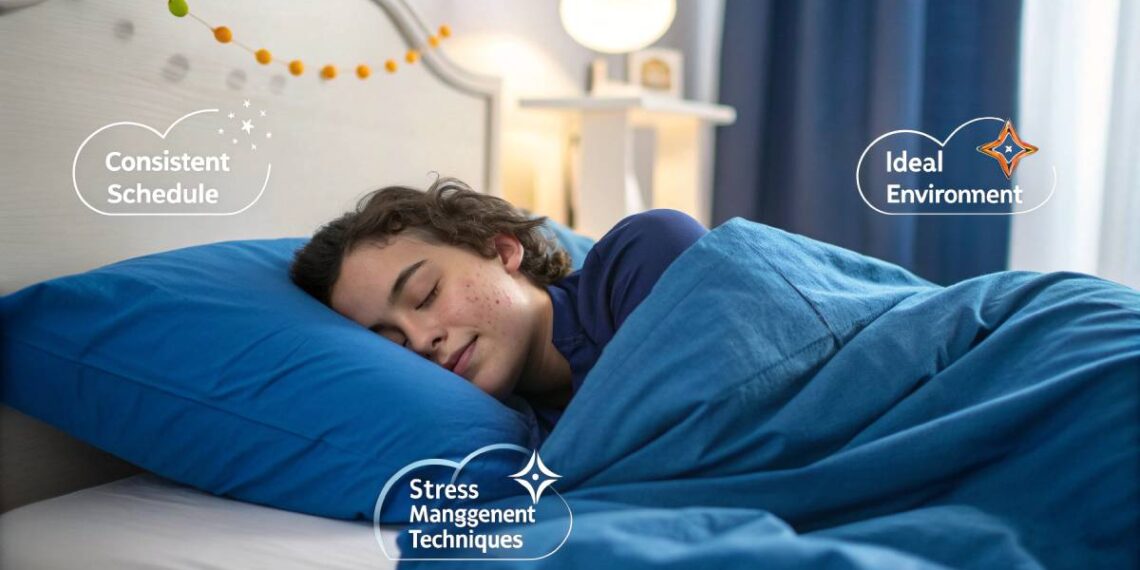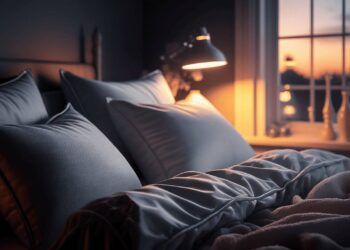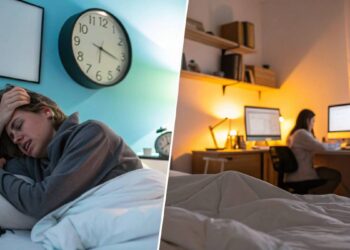In a world that never stops, quality sleep has become the ultimate luxury. Yet this biological necessity holds the key to unlocking your full potential – physically, mentally, and emotionally. Beyond simply avoiding the foggy-headed fatigue of sleepless nights, mastering your sleep transforms everything from your immune system to your mood, cognitive function, and even longevity. Ready to revolutionize your life? It starts tonight, in the sanctuary of your bedroom, where the simple act of closing your eyes becomes your most powerful daily reset button.
Key Takeaways
- Quality sleep significantly reduces risks of heart problems, diabetes, and weight gain
- Consistent sleep schedules (even on weekends) optimize your body’s natural rhythms
- Creating an ideal sleep environment (60-67°F, dark, quiet) dramatically improves sleep quality
- Exercise enhances sleep, but timing matters (avoid vigorous workouts close to bedtime)
- Stress management techniques like progressive muscle relaxation, deep breathing, and meditation effectively combat insomnia
- Sleep technology (trackers, white noise machines, smart lights) can optimize your sleep experience
- Professional help should be sought when persistent sleep issues interfere with daily functioning
Why Getting Your Zzz’s Matters
Let’s talk sleep — it’s a big deal! Quality shut-eye can do wonders for your body and mind. Mixing the good with the bad, this is why getting enough sleep matters and how it can seriously jazz up your life.
“Sleep is the golden chain that ties health and our bodies together.” – Thomas Dekker, English dramatist
What Happens When You Don’t Sleep Well
Lack of sleep can really mess with your mojo. Think about those who toss and turn — folks on late-night shifts, new parents, stressed-out workers, students cramming till dawn, or older folks who can’t get comfortable. Here’s a quick look at the fallouts:
- Your Body: Not enough sleep raises the chances of really crummy stuff like heart issues, diabetes, and packing on the pounds.
- Your Mind: Bad sleep can leave you foggy, blue, anxious, or just plain grumpy.
- Your Defenses: Skipping Zzz’s weakens that line of defense, so your body’s basically got the welcome mat out for germs.
- Your Safety: Sleepy brains mean bad news while driving or on-the-job blunders.
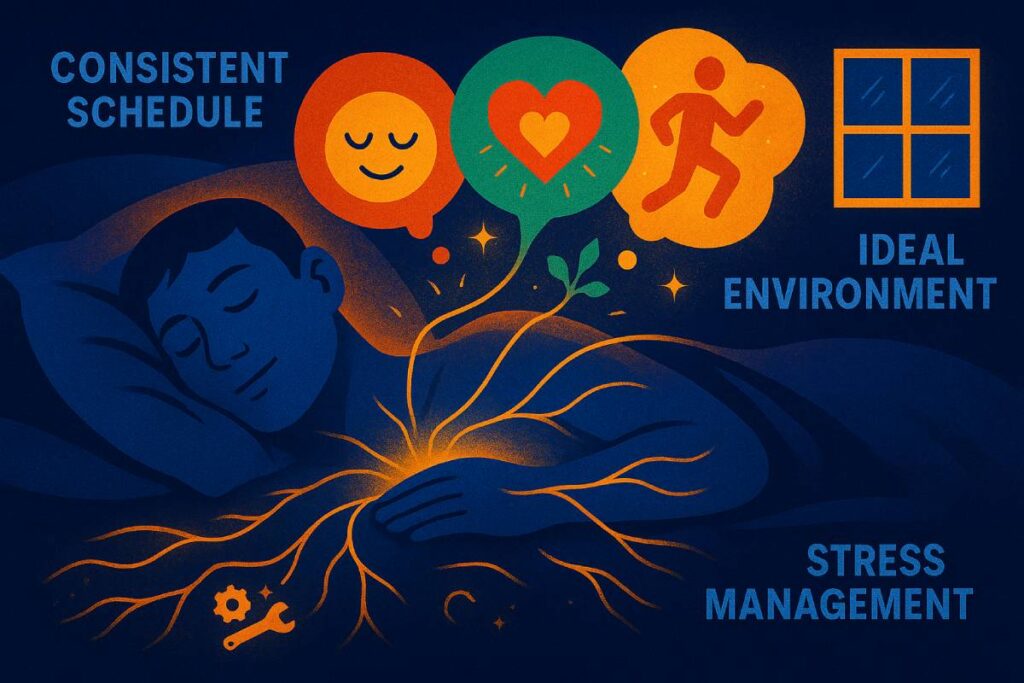
The Perks of Sleeping Like a Baby
Catching quality Zzz’s means all sorts of good stuff follows. Here’s what you should know to make the most of your pillow time. For more sleepy-time hacks, hit up our tips for better sleep and sleep hygiene tips pages.
- Feel Great Physically: Your body’s like a well-oiled machine with good sleep, lowering risks of nasty chronic things.
- Get Happy in Your Head: Sleeping well can lift your mood and keep anxiety and gloom at bay.
- Stay Strong: Solid sleep lets your immune system step up, fighting off nasties with ease.
- Boost Brain Power: Sleep makes your brain work smarter, sharpening focus, memory, and those quick-thinking skills.
- Feel the Calm: Enough sleep keeps you grounded, making stress more manageable and social interactions smoother.
By getting schooled on why sleep matters, you’re stepping up to fight the tired. For more pointers on better nights, check out our articles on natural sleep boosters and how to snooze like a pro.
Getting Your Snooze On: How to Sleep Like a Baby
Tossing and turning all night like a bag of mixed candy? Getting good rest ain’t just nice—it’s life-changing. This survival guide will show you how to sleep better, featuring your trusty sleep schedule and the power of chill.
Bedtime Regularity: Your Body’s New Best Friend
Say goodbye to erratic sleep patterns! A solid sleep schedule is like giving your body a friendly nudge to be a predictable pal. When you hit the hay and rise the rooster each day at the same times, your inner clock gears up, ready for action.
- Sleep and Wake Same Time, Always: Yes, that means weekends too! Those late-night Netflix marathons can wait.
- Naps Are Not Your Friend: They seem like a good idea, but keep them short and sweet—20-30 minutes tops—if you must.
- Z’s Sweet Spot: Most grown-ups thrive on 7-9 hours of sleep, but you do you—find your magic window.
How Much Sleep Do You Need? Check Your Age
| Age Group | Sweet Sleep Spot |
|---|---|
| Teeny Newborns (0-3 months) | 14-17 hours (sleepy heroes) |
| Tiny Infants (4-11 months) | 12-15 hours |
| Turbo Toddlers (1-2 years) | 11-14 hours |
| Peewee Preschoolers (3-5 years) | 10-13 hours |
| School Whiz Kids (6-13 years) | 9-11 hours |
| Teen Time (14-17 years) | 8-10 hours |
| Adulting (18-64 years) | 7-9 hours |
| Golden Years (65+ years) | 7-8 hours |
Check out our full guide on how to stick to a sleep schedule for more nitty-gritty.
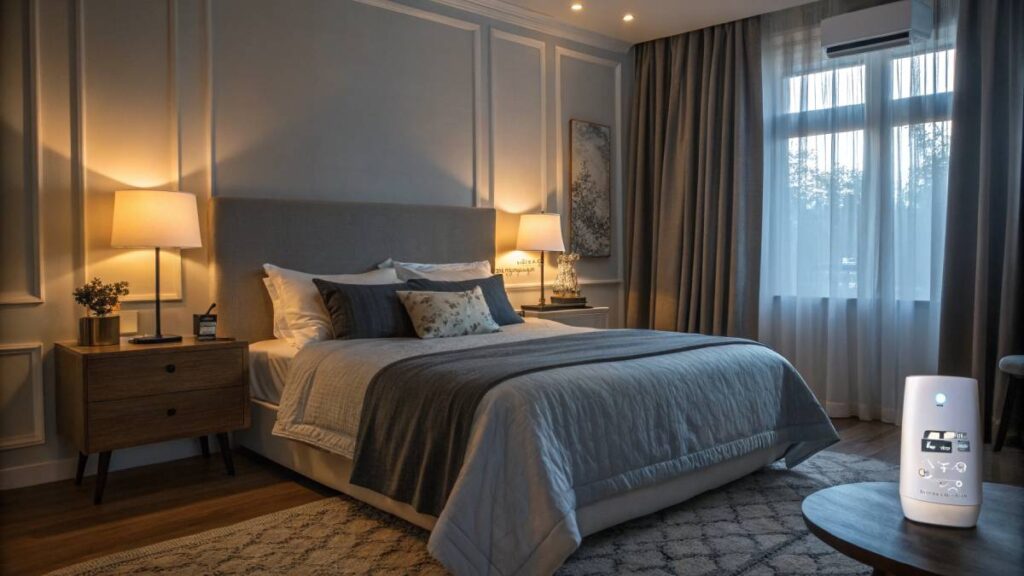
Crafting Your Chill: Bedtime Routine 101
It’s all about chilling before bedtime—think of this as your personal wind-down chill fest to signal the brain, “We’re calling it a night!” This could involve less hustle, more zen.
- 30 Minutes of Zen: Last half-hour before bed, do mellow stuff like book-flipping or soaking in soft tunes.
- Screens Are the Enemy: Our glowing gadgets love stealing sleep; kick ’em out one hour before bed.
- Become a Relaxation Pro: Try deep breathing (aka fancy breathing) or some laid-back yoga moves.
Bringing some nature into your pre-sleep routine, like sniffing calming scents or slurping soothing teas, can really kick your Z’s into high gear. For more zen tips, head to our natural sleep enhancers.
By syncing up your body clock and dialing down drama before bed, you’ll be on your way to snooze like a pro. For more sleep nuggets, don’t miss our sleep tips page for a shortcut to dreamland.
Optimizing Your Sleep Spot
Setting up the perfect sleep space can really help with getting some good shut-eye. Whether you’re dealing with insomnia, working odd hours, stressed out from work, juggling life with kids, or cramming as a student, getting your sleep zone right can make a world of difference to catching those Zs.
“Your bedroom should be a sanctuary, a place where you can reliably find peaceful rest.” – Dr. Matthew Walker, neuroscientist and sleep expert
Ultimate Snooze Zone
Building your own sleep haven involves a mix of things to keep comfy and cut out the junk that wakes you up. Really, it’s all about the room’s chill factor, the sound (or lack thereof), how dark it is, and making it feel snug.
Keeping it cool, around 60-67°F (15-19°C) is key. Like a bear in hibernation, you’ll nod off easier in the right chill. Blackout curtains are your best bet for banishing those slivers of dawn light, and white noise can help drown out pesky sounds (or you can just go for earplugs if that’s your jam).
| What Matters | What Works Best |
|---|---|
| Room Temperature | 60-67°F (15-19°C) |
| Noise Level | As quiet as you can get (try white noise) |
| Light Exposure | Nice and dark (blackout curtains rock) |
| Room Vibe | Neat, no clutter, calm colors |
Getting all these ducks in a row can make your sleep space as peaceful as a whispering stream. Following some sleep hygiene tips might also help get your snooze space dialed in.
Getting Cozy with Bedding and Mattress
Your bedding’s gotta be comfy. That mattress you picked out? It’s gotta have your back, literally. You don’t wanna be waking up sore ’cause your mattress isn’t pulling its weight.
Your mattress should hold you up right where it counts and keep you comfy. Got back pain? That’s a factor too. Give your mattress a toot goodbye every 8-10 years for optimal snoozing.
Pillowcases, sheets, the whole sha-bang, go for materials that let your skin breathe. Cotton and bamboo are top picks for being super soft and not making you overheat at night.
| Bedding Thing | Why It Matters |
|---|---|
| Mattress | Gives the support you crave |
| Pillow | Cradles your noggin just right |
| Sheets | Cotton or bamboo for breathable bliss |
| Blankets | The right weight to keep warm and cozy |
For more hacks on catching premium snooze, check out our sleep improvement hacks and tips for better sleep.
Putting these tweaks into action can give you the kind of restful, recharging sleep that dreams are made of. Turn your sleep environment up a notch, and say hello to better dreams and brighter days. For fresh ideas, peek at sleep optimization tips and top sleep improvement tips.
Maintaining a Balanced Lifestyle for Better Sleep
Getting quality shut-eye means living a life that’s a bit like a smoothie—well-blended with regular exercise and a wholesome diet, while steering clear of those sneaky stimulants. These factors can really help you snooze better.
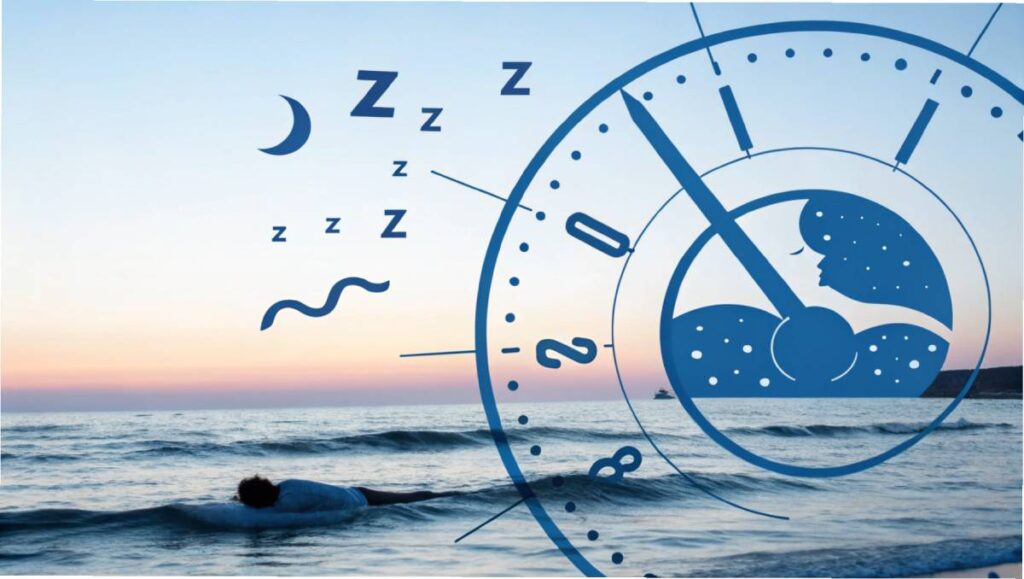
Wiggle and Jiggle: The Exercise Chapter
Moving around can do wonders for hitting the hay. It helps with setting your internal clock, stress-busting, and even clearing up those pesky sleep issues like insomnia. If you’re looking into walking, swimming, or hopping on a bike, these activities can work magic on your sleep.
| Time of Day | Sleep Magic |
|---|---|
| Morning | Wakes you up and sets your clock straight |
| Afternoon | Cools you down later, helping you catch z’s |
| Evening | Might mess with your sleep if done too late |
If you want better sleep, try to squeeze in about 30 minutes of moderate exercise most days. But skip those hard-hitting workouts right before bedtime—they might just backfire. Need some exercise sleep tricks? Consider activities you love and can stick with.
Munch Right and Ditch the Buzz
What’s on your plate matters for your sleep, too. A balanced diet full of good stuff supports your health, helping you snooze like a pro. Some foods are sleep champs, boosting melatonin with tryptophan, magnesium, and calcium.
Now, put down that caffeine and nicotine—they’re the party crashers for sleep! Keep ‘em at bay, especially before sleep time. And just so you know, while you might think alcohol’s a sleep buddy, it actually cuts sleep short and leaves it in bits.
| What’s in It | Sleep Drama |
|---|---|
| Caffeine | Wakes you up, keeps you awake longer |
| Nicotine | Stirs you up, breaking sleep |
| Alcohol | Jumbles REM sleep, leading to rough rest |
For better sleep through what you eat, check out natural sleep boosters. By pairing a balanced diet with smart caffeine habits, you’re looking at some sweet snooze improvements.
Roll exercise, a good diet, and saying “no thanks” to stimulants into one, and voilà—you’ve got yourself a recipe for top-notch sleep. Want to find more about sleep hacks? See how these small tweaks can better your sleep and well-being game.
Managing Stress and Anxiety for Improved Sleep
Tossing and turning, staring at the ceiling—stress and anxiety can mess with your sleep in the worst ways. But fear not, you can turn the tables by keeping those pesky intruders in check and getting the rest you deserve.
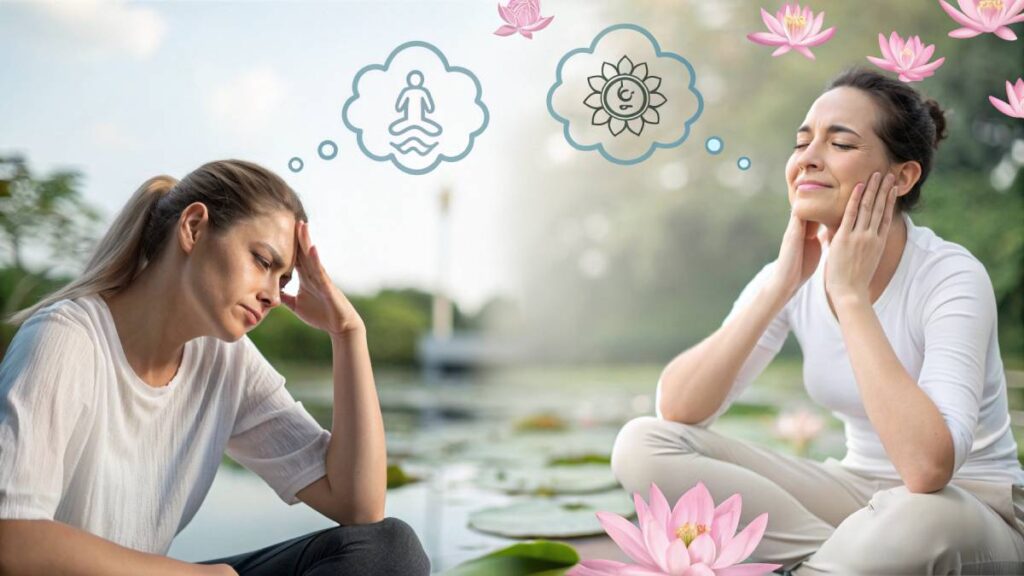
Techniques for Stress Busting
Think of these techniques as your secret weapon stash for creating a chill vibe that’s perfect for catching z’s. Try adding them to your daily routine to make stress walk the plank and let sleep sail smoothly.
Progressive Muscle Chillout (PMC)
Progressive Muscle Chillout (PMC)—sounds fancy, but it’s just a slow jam session for your muscles. Tighten up, then let go, and feel those shoulders drop like they’re made of feathers. Here’s the roadmap:
| Step | Muscle Group | Don’t Rush (seconds) |
|---|---|---|
| 1 | Hands (fist clenching) | 5-7 |
| 2 | Biceps (flexing) | 5-7 |
| 3 | Shoulders (shrugging) | 5-7 |
| 4 | Neck (tilt back) | 5-7 |
| 5 | Stomach (tighten abs) | 5-7 |
| 6 | Thighs (tighten) | 5-7 |
| 7 | Feet (curl toes) | 5-7 |
Breathe It Out
Deep breathing is your body’s way of hitting the ‘reset’ button. It’s simple: just breathe in through your nose, hold, and let it out like a sigh of relief. Easy as pie.
- Inhale through your nose for 4 seconds.
- Hold it steady for 7 seconds.
- Slow exhale through your mouth for 8 seconds.
Do this a few rounds before bed, and you’ll be ready to dive under the covers feeling zen.
Mindfulness and Meditation Magic
Mindfulness and meditation are like the dynamic duo of stress-busting. Bring these into your life and watch your sleep quality do a happy dance.
Mindfulness Moment
Being mindful is all about soaking up the now, without letting tomorrow crash the party. Whether it’s your breath, your senses, or the sounds around you, staying present can bring serenity before bed.
- Find a peaceful spot.
- Get comfy, sit or lie down.
- Focus on your breath.
- Observe your thoughts like passing clouds.
- Gently bring back focus if your mind wanders off for a stroll.
Guided Meditation Groove
Pop in some guided meditation or an app and let someone else lead the way. It’s like having a GPS for your mind, steering it towards relaxation.
If you’re new to this, start small and build your way up. Hook mindfulness and meditation with other handy sleep hacks for a Jedi-level sleep routine.
By weaving stress-busting maneuvers and a sprinkle of mindfulness into your day, you’re not just enhancing sleep but leveling up your overall good vibes. Check out our sleep quality ideas for more ways to upgrade your snooze game. Sleep tight!
Boosting Sleep Quality with Tech Magic
When it comes to nodding off into dreamland, technology’s got your back – if you let it. It’s like having a tiny wizard that helps you sleep better. We’re about to check out two tech heroes: those sneaky little sleep trackers and the snazzy duo of white noise machines with smart lights.
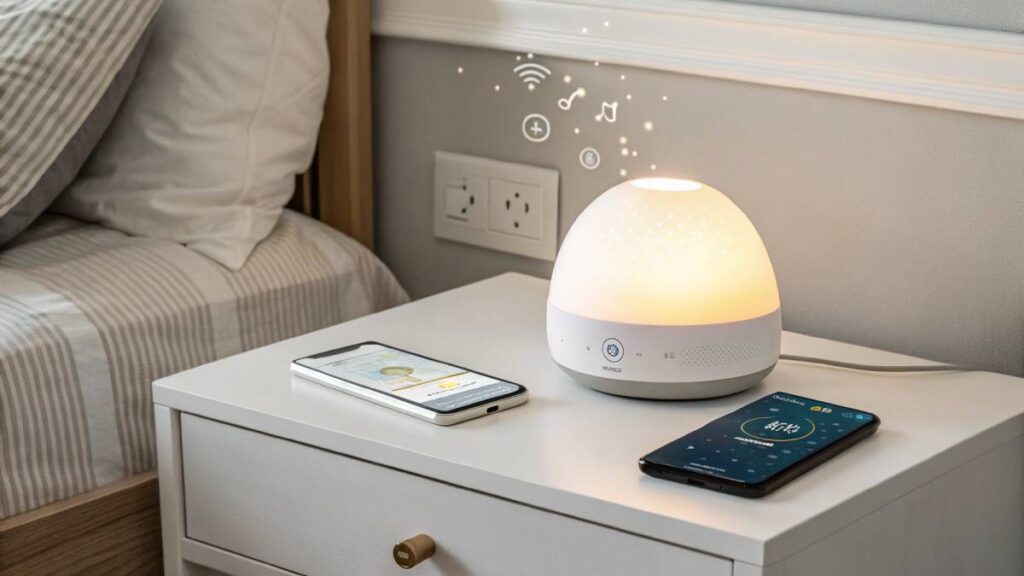
Sleep Trackers and Apps
Think of sleep trackers and apps as your personal sleep detectives. They keep tabs on your forty winks, showing you how long you snooze like a log and when you toss and turn. Armed with this info, you can tweak your bedtime routine for better rest.
| Feature | Details |
|---|---|
| Sleep Monitoring | Keeps track of different sleep stages (like light, deep, REM) |
| Sleep Score | Rates your sleep – ’cause everyone loves a good score, right? |
| Sleep Tips | Gives you custom advice based on your snooze habits |
| Smart Alarms | Gently wakes you when you’re sleeping lightest, not rudely, no siree |
| Syncing | Joins forces with other health apps to track your wellness everywhere |
These sleuths sometimes include guided meditations and breathing routines, ideal if insomnia or stress lurks. If you’re curious on more snooze-friendly advice, pop over to our tips on making sleep awesome.
White Noise Machines and Smart Lights
Meet the partners in crime for those sleep aides – white noise machines and smart lights, stars in the snooze cosmos. White noise machines whip up calming sounds – like rain or ocean waves – that drown out pesky distractions and help create a chill zone for sleep.
| Device | Why They’re Cool |
|---|---|
| White Noise Machines | Quietly smothers noise, chills you out |
| Smart Lights | Tweak lighting to keep nature’s rhythm rockin’ |
As for smart lights, they’re the sunrise and sunset maestros. You can set them to slowly get dimmer at night, hinting it’s bedtime, or to brighten in the morning, nudging you awake naturally.
If you’re aiming to sleep soundly without popping pills, syncing up with these gadgets might do the trick. Swing by and peep our piece on natural ways to hit the hay for more nifty ideas.
Embracing technology in your sleep game can be your golden ticket to dreamland. From tracking your zzz’s to setting the perfect sleepy-time scenery, this tech packs a punch. For more sleep tips tailored just for you, check out our snooze-boosting tips.
Getting Help with Sleep Woes
When tossing and turning becomes the norm, reaching out for professional assistance might just be the ticket to dreamland. Chatting with your doctor or considering sleep disorder tests and treatments can change the way you hit the hay.
Seeing Your Doctor
If your lack of shut-eye starts to mess with your daytime mojo, a visit to the doctor’s office might do the trick. They can unravel why you’re struggling in the sack and offer suggestions that hit home.
- Family Doctors: They’re your go-to for a once-over and might hook you up with a sleep expert if it seems like you need it.
- Sleep Gurus: Sleep specialists are the wizards of diagnosing and fixing sleep hiccups. Whether it’s new habits or meds, they’ve got strategies to get you back on track.
For those needing quick fixes, check out our piece on better sleep tips.
Sleep Disorder Tests and Fixes
Getting to the bottom of your sleep saga often calls for some testing, which clues you in on what’s messing up your slumber. Here’s a lowdown on the tests and what they’re all about:
- Sleep Studies: Checked out in a lab, these studies keep tabs on your body while you doze to spot issues like sleep apnea and twitchy legs.
- DIY Sleep Tests: A cost-effective alternative done at home, mainly for sleep apnea diagnosis.
- Sleepiness Snap-Test (MSLT): This helps figure out how fast you fall asleep during the day, often key for spotting narcolepsy.
Here’s a nifty table of common tests and what they aim to find:
| Sleep Test | Purpose |
|---|---|
| Polysomnography | All-around check to pinpoint assorted disorders |
| Home Sleep Test | Targets sleep apnea sniffing |
| Multiple Sleep Latency | Checks day-time drowsiness and narcolepsy insight |
When a sleep issue gets nailed down, here’s how it might get tackled:
- Cognitive Behavioral Therapy for Insomnia (CBT-I): Swap out those restless habits and thoughts with behavior that beckons relaxation.
- CPAP Gear: This gadget pumps air to clear the breathing blocks during sleep, a lifesaver for obstructive sleep apnea.
- Sleep Meds: Sometimes, pills can help handle sleep troubles as a quick fix but usually in a mix with other remedies.
Want more sleep wisdom? Poke around our sleep improvement techniques and natural sleep hacks.
Diving into consultations and exploring testing for sleep disorders can pave the way for snooze-time success and make life during the day that much better. For more sleep-savvy strategies, scope out our piece on boosting sleep smarts.
Main Tips
- Consistency Conquers All: Maintain the same sleep-wake schedule even on weekends to optimize your circadian rhythm.
- Temperature Matters More Than Comfort: Keep your bedroom between 60-67°F (15-19°C) for optimal sleep conditions.
- The 3-2-1 Rule: Stop working 3 hours before bed, stop eating 2 hours before bed, and stop screen time 1 hour before bed.
- The 20-Minute Rule: If you can’t fall asleep after 20 minutes, leave the bed and do something relaxing until you feel sleepy again.
- Light Management Is Crucial: Maximize daylight exposure in the morning and minimize artificial light in the evening to regulate melatonin production.
- Exercise Timing Affects Sleep Quality: Regular physical activity improves sleep, but avoid vigorous exercise within 2-3 hours of bedtime.
- The Caffeine Half-Life: Caffeine has a half-life of 5-6 hours, meaning half remains in your system that long after consumption—plan accordingly.
- Alcohol Disrupts REM Sleep: While it might help you fall asleep faster, alcohol significantly reduces sleep quality by disrupting REM sleep.
- Progressive Relaxation Works: Systematically tensing and relaxing muscle groups before bed effectively signals your body to prepare for sleep.
- Track to Optimize: Use sleep tracking for 2-4 weeks to identify patterns and problems before making major sleep habit changes.
Conclusion
The journey to better sleep isn’t just about more hours in bed—it’s about transforming your entire relationship with rest. From understanding the profound impact of quality sleep on every bodily system to implementing practical strategies like consistent schedules, optimized sleep environments, and stress management techniques, you now have a complete toolkit for revolutionary rest.
Remember that sleep improvement is often cumulative—small changes consistently applied yield remarkable results over time. Your body naturally wants to follow circadian rhythms; your task is simply removing the obstacles modern life places in its path. Whether through creating your perfect sleep sanctuary, managing stress through mindfulness practices, or carefully timing your exercise and nutrition, each adjustment brings you closer to restorative sleep.
If challenges persist despite your best efforts, professional guidance offers another layer of support. Sleep medicine specialists can identify underlying disorders and provide targeted interventions that address your specific needs. In prioritizing quality sleep, you’re not just investing in better mornings—you’re enhancing your cognitive performance, emotional resilience, physical health, and ultimately, your longevity. The path to your best life passes directly through the gateway of better sleep.
FAQs
How much sleep do I really need?
Sleep needs vary by age. Adults (18-64) typically require 7-9 hours, while seniors (65+) need about 7-8 hours. Children and teenagers need significantly more—up to 17 hours for newborns, gradually decreasing as they age. However, individual needs may vary based on factors like activity level, overall health, and genetics. The best indicator is how you feel during the day—if you’re consistently tired despite getting what should be adequate sleep, you might need to adjust your sleep duration.
Why do I wake up tired even after sleeping 8 hours?
Waking up tired despite sufficient sleep time could indicate poor sleep quality rather than quantity issues. Common culprits include sleep disorders (like sleep apnea), interrupted sleep cycles, poor sleep environment (too hot, too noisy), caffeine or alcohol consumption, certain medications, stress or anxiety, or inconsistent sleep schedules. Try improving sleep hygiene practices before seeking medical help if symptoms persist.
Can I make up for lost sleep on weekends?
While catching up on some sleep debt is possible, weekend recovery sleep doesn’t fully compensate for chronic sleep deprivation during the week. This pattern, called “social jetlag,” disrupts your body’s circadian rhythm and can actually worsen sleep problems long-term. Consistency is key—aim for regular sleep and wake times even on weekends, with no more than an hour’s difference from your weekday schedule.
How does screen time affect my sleep?
Electronic devices emit blue light that suppresses melatonin production, the hormone that signals your body it’s time to sleep. Additionally, engaging content keeps your brain stimulated when it should be winding down. For optimal sleep, avoid screens at least one hour before bedtime, or use blue light filters and night mode settings if complete avoidance isn’t possible.
What foods help promote better sleep?
Sleep-friendly foods contain nutrients that support melatonin production and relaxation, including tryptophan, magnesium, and calcium. Good choices include tart cherries (natural melatonin), kiwi, fatty fish, nuts (especially almonds and walnuts), warm milk, chamomile tea, bananas, and oats. Timing matters too—eat sleep-supporting foods 2-3 hours before bedtime to avoid digestive discomfort.
When should I see a doctor about my sleep problems?
Consult a healthcare provider if you experience persistent sleep difficulties (lasting more than a month) despite trying good sleep hygiene practices, if daytime sleepiness interferes with daily activities, if you have unusual symptoms like gasping during sleep, or if sleep problems occur alongside other health concerns. Sleep disorders are medical conditions that often require professional diagnosis and treatment.
Resources
- National Sleep Foundation – Comprehensive resource for sleep education, research, and improvement strategies
- American Academy of Sleep Medicine – Professional society dedicated to sleep medicine, offering patient resources and accredited sleep center listings
- Harvard Medical School Division of Sleep Medicine – Research-based information about healthy sleep and circadian biology
- CDC Sleep and Sleep Disorders – Public health information about sleep disorders and hygiene
- Sleep Research Society – Scientific organization advancing sleep and circadian science
- Sleep Education by AASM – Patient education website with accessible information about sleep disorders and healthy sleep
Final Thoughts
The quest for better sleep represents one of the most impactful yet underappreciated health interventions available to everyone. Unlike many wellness trends requiring special equipment or expensive supplements, sleep improvement begins with simple, accessible changes to your habits and environment.
What makes sleep so fascinating is how it touches every aspect of your being—from cellular repair to emotional processing, memory consolidation to immune function. In our achievement-oriented society, we’ve somehow relegated sleep to a luxury rather than recognizing it as the biological necessity it truly is.
As you implement the strategies outlined in this guide, remember that patience and consistency are key. Your sleep patterns developed over years and may take time to optimize. Track your progress not just in hours slept but in how you feel during waking hours—your energy levels, mood stability, cognitive clarity, and overall vitality are the true measures of sleep quality.
The sleep revolution is ultimately personal. While science provides the framework, discovering your unique sleep needs and preferences requires self-exploration. Consider this guide not as a rigid prescription but as an invitation to rediscover one of your body’s most fundamental and restorative processes.
Recommended Sleep Products: Essential Tools for Your Sleep Revolution
Transform your sleep experience with these carefully selected products that address every aspect of sleep optimization. Each recommendation is backed by sleep science and designed to help you implement the strategies discussed in our comprehensive guide.
Bedroom Environment Essentials
Premium Blackout Curtains
Deconovo Total Blackout Thermal Insulated Curtains Create the perfect dark sleep environment with these 100% blackout curtains that block sunlight and reduce outside noise. Their thermal insulation properties also help maintain optimal bedroom temperature.
Advanced Sleep Sound Machine
Hatch Restore Sound Machine This all-in-one smart sleep assistant combines a sound machine, sunrise alarm, smart light, meditation app, and alarm clock. Create personalized sleep-wake routines that help signal your body when it’s time to wind down and when it’s time to wake up.
Temperature-Regulating Bedding
SHEEX Original Performance Sheet Set Experience cooler, more comfortable sleep with these breathable, moisture-wicking sheets that help maintain optimal sleep temperature. Perfect for hot sleepers or anyone looking to optimize their sleep environment.
Mattress & Pillows
Supportive Memory Foam Mattress
Nectar Queen Mattress This medium-firm memory foam mattress offers five layers of comfort and support, ideal for all sleep positions. With cooling technology and minimal motion transfer, it’s perfect for optimizing your sleep surface.
Cervical Support Pillow
Tempur-Pedic TEMPUR-Neck Pillow Designed by doctors to properly support your head, neck, and shoulders, this ergonomic pillow helps maintain proper spinal alignment during sleep and reduces neck pain and stiffness.
Cooling Weighted Blanket
YnM Cooling Weighted Blanket Experience the calming, anxiety-reducing benefits of gentle pressure combined with cooling bamboo fabric. This weighted blanket helps reduce restlessness and promotes deeper, more restful sleep.
Sleep Technology
Advanced Sleep Tracker
Oura Ring Generation 3 Monitor your sleep stages, heart rate, body temperature, and activity levels with this sleek, non-intrusive smart ring. Get personalized insights and recommendations to improve your sleep quality over time.
Blue Light Blocking Glasses
LNEKEI Blue Light Blocking Glasses Protect your circadian rhythm by blocking harmful blue light from screens in the evening hours. These stylish, lightweight glasses help prevent melatonin suppression when using devices before bedtime.
Smart Bedroom Lighting
Philips Hue White and Color Ambiance Starter Kit Create the perfect sleep-promoting light environment with these programmable smart bulbs. Set them to gradually dim in the evening and simulate sunrise in the morning to support your natural circadian rhythm.
Sleep Supplements & Relaxation Aids
Natural Melatonin Supplement
Nature Made Melatonin 3mg Tablets Support your natural sleep cycle with this highly-rated melatonin supplement. Particularly helpful for jet lag, shift work, or occasional difficulty falling asleep.
Magnesium Sleep Complex
Natural Vitality Calm Magnesium Supplement This highly absorbable magnesium supplement helps relax muscles and calm the nervous system, creating optimal conditions for restful sleep. The pleasant-tasting powder dissolves easily in water.
Aromatherapy Sleep Set
LAGUNAMOON Essential Oils Gift Set Harness the sleep-promoting powers of aromatherapy with this set of six essential oils including lavender, chamomile, and eucalyptus. Pair with an ultrasonic diffuser for optimal benefits.
Sleep Comfort Accessories
Sleep Mask & Earplugs Kit
MZOO Sleep Eye Mask with Contoured Cup and Earplugs Block out light and sound completely with this memory foam contoured sleep mask and earplug set. The 3D design prevents pressure on your eyes while creating complete darkness.
White Noise Machine
Yogasleep Dohm Classic White Noise Machine Create a consistent sound environment that masks disruptive noises with this fan-based white noise machine. The natural, non-looping sound provides the perfect background for uninterrupted sleep.
Bedroom Humidifier
LEVOIT Humidifiers for Bedroom Maintain optimal bedroom humidity (40-60%) for better breathing and sleep quality with this whisper-quiet ultrasonic humidifier. Especially beneficial during dry seasons or for those with respiratory issues.
Sleep Tracking & Improvement Apps
Premium Sleep App Subscription
Sleep Cycle Premium Take your sleep optimization to the next level with this intelligent alarm clock that tracks your sleep patterns and wakes you during your lightest sleep phase, resulting in feeling more refreshed and energetic.

